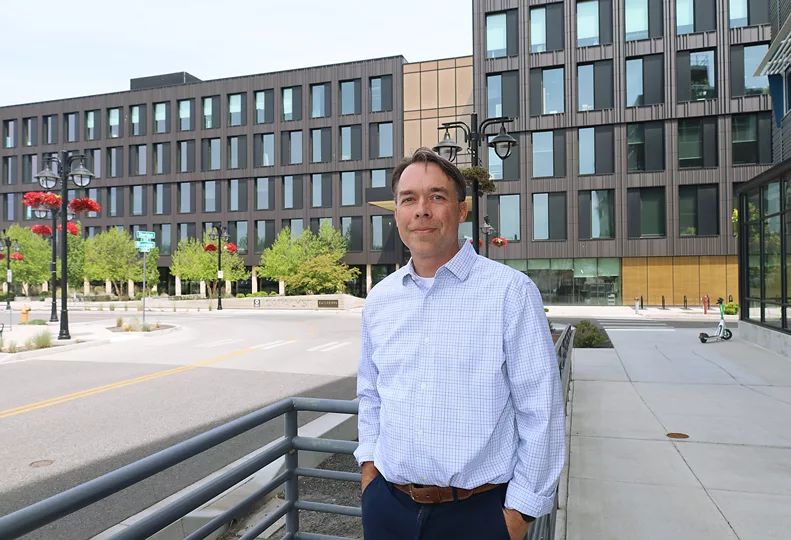
Urbanova, Intent merge to form INW energy cluster
New entity hopes to establish Eastern Washington as a hub for innovation

Mason Burley, Urbanova CEO says the merger with Intent LLC is a strategic move to form a stronger team to tackle energy projects in the Inland Northwest.
| Karina EliasTwo Spokane-based energy innovation groups have merged to launch a new energy innovation cluster backed by state funding.
Board members of Inland Northwest Center for Energy and Decarbonization LLC, known as Intent, and the nonprofit organization Urbanova signed a memorandum of understanding earlier this month to form the new organization, tentatively named Inland Northwest Energy Innovation Cluster. The new nonprofit organization is now operating under a transitional board. Leaders say they plan to unveil a new company name, strategic initiatives, and organizational structure in the fall.
Mason Burley, CEO of Urbanova, says the impetus for the merger is to position Spokane and the surrounding region as a testbed for cutting-edge energy solutions, ranging from grid modernization to distributed energy systems. The region already is home to several companies working in this space, he says, including companies like Itron, Inc., which developed a smart metering technology, and McKinstry Co., which is spearheading geothermal projects in the area, among many others.
“The vision is to support and accelerate the great work that’s already happening here,” Burley says. "Those innovations are going to result in more efficiency ... that can really help establish the energy future and the energy economy."
The push for energy innovation comes as utilities and communities brace for growing demand, try to address aging infrastructure, and deal with the impacts of climate change, Burley adds. Factors like rapid load growth from data centers, increasing strain on transmission systems, and the need for more resilient renewable-rich grids are driving urgency in the sector, he says.
Regional collaboration will be essential to navigate these challenges, Burley says.
To help shape the long-term vision, the organization is hosting an Energy Innovation Summit on July 8 and 9 at Washington State University’s Spokane campus. The event will bring together stakeholders from industry, academia, and the public sector to identify regional energy challenges and opportunities, Burley says. Insights from the summit will inform a strategic planning process led by the organization’s interim board, which is expected to finalize its direction and board expansion plans by September.
Urbanova was established in 2017 as a smart city collaboration between the city of Spokane, Washington state University, Avista Corp., McKinstry, and Itron. Initially focused on deploying and studying emerging technologies—such as smart streetlights and air-quality monitors—in Spokane’s University District, the organization later expanded into community-centered research on how technology affects residents, particularly in terms of energy use, housing insecurity, and public health. Urbanova is based at the WSU Center for Innovation, at 120 N. Pine in the University District, and has two employees and several contractors, says Burley, who assumed his role in 2022.
In 2023, Urbanova was awarded a $1 million development grant from the National Science Foundation as part of its Regional Innovation Engines program, says Burley. The grant supported early efforts to establish Eastern Washington as a hub for energy innovation, particularly in grid modernization and clean technology.
“The idea was that the emerging energy innovation is going to be reliant on grid modernization and infrastructure,” Burley says. “And if we can find a way to accelerate innovation around grid architecture and modernization, there are a lot of benefits, both for the community and for the regional economy.”
To meet the National Science Foundation’s requirement for strong industry involvement, a separate entity—Intent, the Inland Northwest Center for Energy and Decarbonization—was created. The spinoff group acted as a liaison between academic institutions and private industry, bringing together partners from Washington State University, the University of Idaho, the Pacific Northwest National Laboratory, and others, Burley says.
"What Intent brought to the effort was the industry expertise that NSF was interested in," Burley says.
Burley says that following the conclusion of the NSF award in April, leadership from Urbanova and Intent began discussions about how to sustain the momentum of their joint work over the past two years. With overlapping missions and a shared network of partners, the two groups saw merging as a strategic move to streamline operations, strengthen funding opportunities, and clarify their regional role in energy innovation.
The merger is also a practical step. Both organizations operate with lean staffing, typically one to three core team members supported by contractors, partner organizations, and board members, which include Jason Verduzco, of Verizon Communications Inc.; Latisha Hill, of Avista Corp.; retired Itron Inc. executive Rich Christensen; retired Avista executive John Gibson; and Dan Wadkins, of Foster Garvey PC law firm. By unifying under a single structure and board, the merged entity hopes to improve efficiency, scale projects more effectively, and better position itself for future grants and state-level support, Burley says.
As reported by the Journal, the newly formed entity has already been recognized by the Washington state Department of Commerce as part of its Innovation Cluster Accelerator Program and awarded a $140,000 grant to support planning and development efforts.


_web.webp?t=1769673727)
_web.webp?t=1769673728)
_web.webp?t=1769673735)
